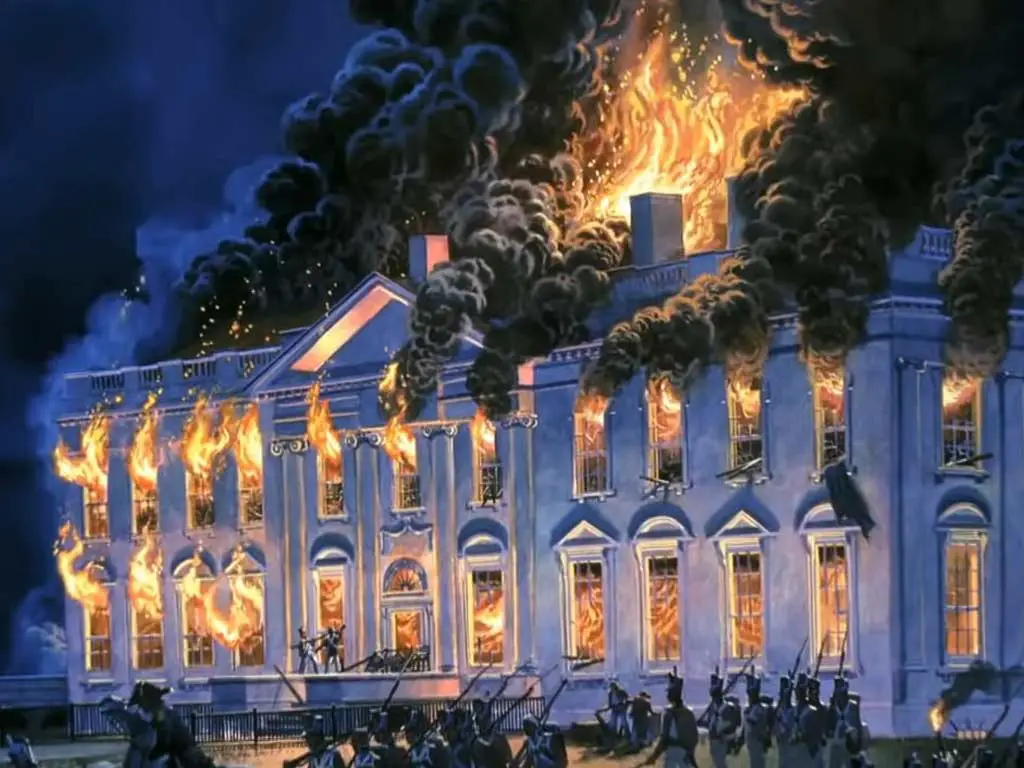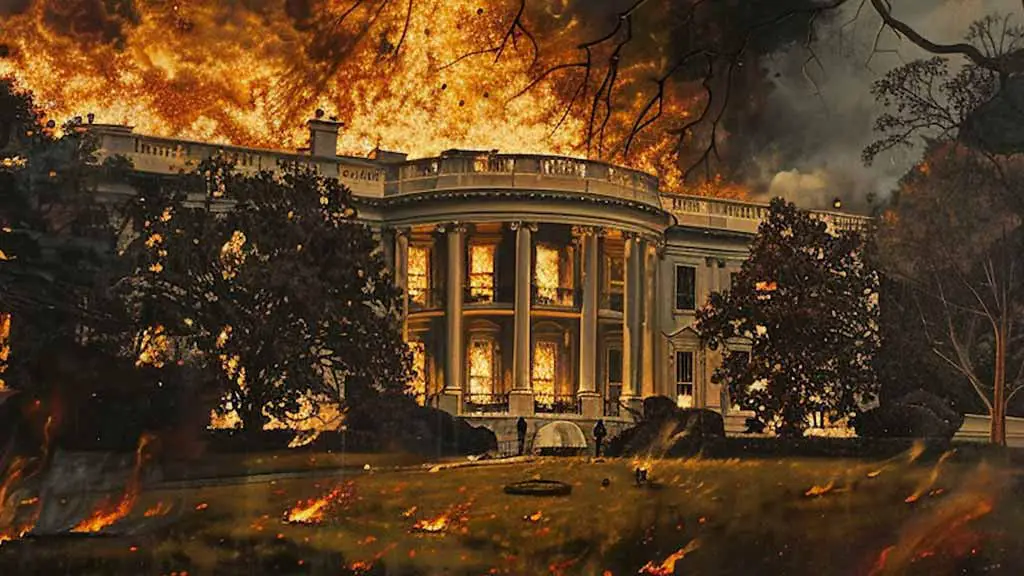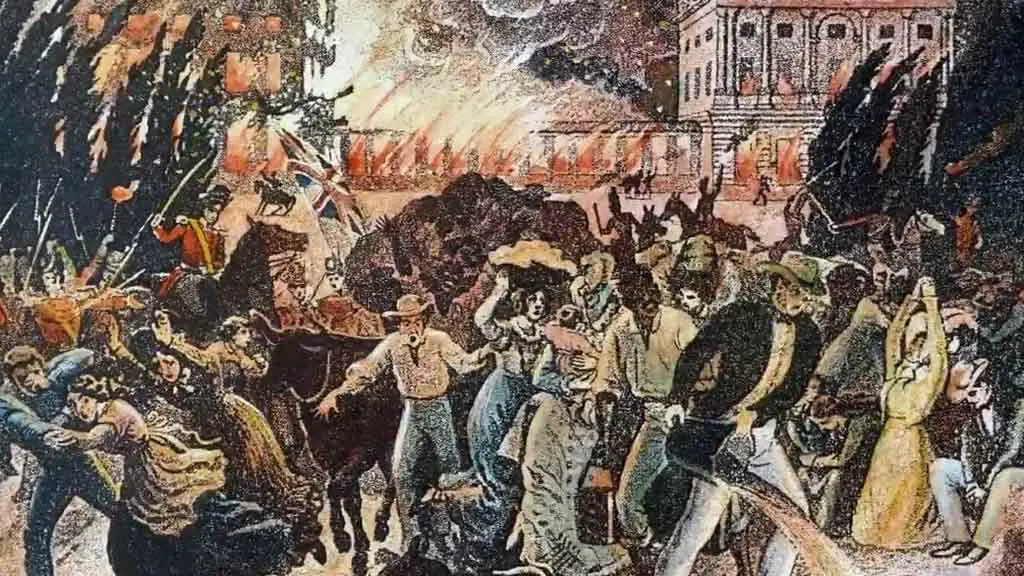During the War of 1812, the burning of Washington, DC by British forces in August 1814 remains a pivotal moment in American history. The question of why the redcoats set fire to the capital city continues to intrigue historians and scholars alike.
Understanding the motivations behind this destructive act sheds light on the complexities of wartime strategies and the tensions between the two nations.
The burning of Washington, DC was a strategic move by the British to retaliate against the American attack on York (modern-day Toronto) and to weaken the morale of the American forces.
By targeting significant government buildings, including the White House and the Capitol, the British aimed to deliver a blow to the young nation’s political and military leadership.
This event not only left a physical scar on the city but also fueled the flames of animosity between the United States and Britain during the War of 1812.

Historical Context of the War of 1812
The War of 1812 was fueled by tensions between the United States and Britain, arising from issues such as trade restrictions, impressment of American sailors, and British support for Native American tribes opposing American expansion.
The conflict escalated due to these longstanding grievances, leading to a declaration of war by the United States in June 1812.
Causes and Major Events Leading to the War
The causes of the War of 1812 can be traced back to British interference with American shipping and impressment of American sailors into the Royal Navy.
Additionally, British support for Native American resistance to American territorial expansion further strained relations between the two nations. These tensions culminated in the United States declaring war on Britain in 1812.
The redcoats set fire to Washington D.C. in retaliation for the burning of York (modern-day Toronto) by American forces. The British troops sought to weaken American morale and retaliate for their losses during the war.
The Burning of Washington DC
The burning of Washington, DC in August 1814 during the War of 1812 was a pivotal event that left a lasting mark on American history. Here’s a detailed exploration of what happened and its significance:
The Event of August 1814

In August 1814, British forces conducted a strategic military campaign that culminated in the burning of Washington, DC. This event marked a significant turning point in the War of 1812 between the United States and Britain.
The burning of Washington, DC by the redcoats was a retaliatory measure in response to the American attack on York (Toronto). It was a strategic move to weaken American morale and demonstrate British military power.
Key Targets and Damages
The British forces targeted key government buildings in Washington, DC, including the White House, the Capitol, and other significant structures.
The deliberate destruction inflicted substantial damage on the city’s political and military infrastructure, leaving a lasting impact on American history.
The redcoats set fire to Washington, DC as a strategic move to weaken the American government and military during the War of 1812. By targeting key buildings like the White House and Capitol, they aimed to disrupt American operations and morale effectively.
Reasons Behind the Attack
During the War of 1812, the British decision to burn Washington, DC was driven by both strategic and psychological considerations, each playing a significant role in their military tactics:
Strategic Motivations
During the War of 1812, the British decision to burn Washington, DC was strategically motivated to weaken the United States by destroying government buildings, disrupting communication networks, and demoralizing American leadership.
These actions were aimed at asserting British dominance in the region and crippling the young nation.
The British strategically targeted Washington, DC to weaken the US by destroying key government buildings, disrupting communication networks, and demoralizing American leadership to assert British dominance and cripple the young nation during the War of 1812.
Inflicting Military Damage
By targeting key government buildings like the White House and the Capitol, the British aimed to inflict substantial damage on the political and military infrastructure of the United States.
This strategic move was intended to disrupt the functioning of the American government, impair its ability to coordinate military efforts, and weaken its overall war effort.
The destruction of these iconic landmarks not only served as a blow to the morale of the American people but also demonstrated the British military’s strength and determination in the War of 1812.
Retaliation for York (Toronto)
The burning of Washington was also a retaliatory measure in response to the American attack and burning of York (modern-day Toronto) earlier in the war.
This act was part of a broader strategy to demonstrate British military prowess and retaliate against American aggression. Setting fire to Washington DC was a strategic move by the redcoats to showcase British military power and retaliate for the American attack on York.
It was a part of their larger strategy of demonstrating strength and responding to perceived aggression.
Psychological Motivations

The psychological motivations behind the British decision to burn Washington, DC during the War of 1812 were crucial in shaping their military strategy and objectives.
These motivations aimed at influencing American morale and public perception in several strategic ways:
Demoralizing the Enemy
The psychological impact of burning Washington was profound. It aimed to demoralize American forces and the civilian population by showing the vulnerability of their capital city.
The deliberate destruction of symbolic government buildings was intended to sow fear and uncertainty among Americans about their ability to defend against British military actions.
This act of destruction was a strategic move to weaken the morale of American troops and civilians, highlighting their inability to protect against British attacks and instilling a sense of fear and doubt in their defenses.
Diplomatic and Strategic Leverage
Beyond military gains, the British hoped that the destruction of Washington would strengthen their negotiating position in peace talks that were anticipated to follow the war.
It was seen as a way to compel the United States to consider more favorable terms and potentially hasten an end to the conflict. Setting fire to Washington DC was a strategic move by the redcoats to exert pressure on the United States during peace negotiations.
By destroying the capital, they aimed to secure better terms and bring a quicker resolution to the conflict.
Overall Impact
The burning of Washington, DC during the War of 1812 had significant immediate and long-term consequences. It symbolized a severe blow to American morale and highlighted vulnerabilities in the nation’s defense capabilities.
The act fueled anti-British sentiment in the United States and contributed to a legacy of strained relations between the two nations, shaping diplomatic interactions for years to come.
Understanding the reasons behind why the redcoats set fire to Washington, DC sheds light on the complexities of the War of 1812 and its aftermath, impacting the course of American history and international relations.
The British Perspective
The British Perspective sheds light on the military strategies and motivations behind the burning of Washington, DC by British forces during the War of 1812.
Military Tactics and Objectives

The British forces, under the command of Major General Robert Ross, executed the burning of Washington as a strategic military maneuver. Their primary objectives were to weaken the U.S. by targeting key government buildings strategically.
The White House and the Capitol were chosen as symbolic targets to diminish American morale and demonstrate British military superiority.
The deliberate destruction was intended to inflict significant damage on the city’s infrastructure, disrupting the functioning of the government and showcasing British military might.
The attack on Washington was part of a broader military strategy to retaliate against American actions and exert pressure on the U.S. during the ongoing conflict.
Impact and Aftermath
After the burning of Washington, DC by British forces in August 1814, the repercussions were significant, both immediately and in the long term.
Immediate Effects on the United States
The immediate aftermath of the burning of Washington, DC had a profound impact on the United States. The destruction of key government buildings like the White House and the Capitol deeply shook the nation.
Americans were left in a state of shock as they witnessed the heart of their government engulfed in flames.
This event not only dealt a blow to the morale of American forces but also raised doubts among the public about the young nation’s ability to defend itself against external threats.
Long-Term Consequences for U.S.-British Relations
The burning of Washington, DC during the War of 1812 had long-term consequences for U.S.-British relations. While the act itself was a military maneuver aimed at weakening the U.S., it significantly strained relations between the two nations.
The attack on the capital city fueled anti-British sentiments in the U.S. and hardened American resolve to continue the fight.
This event played a role in shaping the future diplomatic interactions between the United States and Britain, contributing to a legacy of tension that would persist for years to come.
Frequently Asked Questions
Who led the deliberate burning of Washington, DC in 1814?
Major General Robert Ross led the British forces in burning key government buildings in Washington, DC, including the White House and the Capitol, during the War of 1812.
Why did the British burn Washington, DC?
The British burned Washington, DC to weaken the U.S. both militarily and politically. It was a strategic military tactic to demoralize American forces, disrupt government functions, and show British military superiority.
What were the consequences of the burning of Washington, DC?
The burning of Washington, DC led to strained U.S.-British relations, increased anti-British sentiments in the U.S., and a legacy of tension between the two nations. It also raised doubts about the nation’s defense capabilities.
How did the burning of Washington, DC impact the War of 1812?
The burning of Washington, DC had a significant impact on the War of 1812 as it symbolized a humiliating defeat for the young nation. It highlighted vulnerabilities in the country’s defense and showcased British military strength.
Conclusion
The deliberate burning of Washington, DC by British forces in August 1814 was a strategic military move aimed at weakening the U.S. in various aspects.
Major General Robert Ross led the tactics to target key government buildings, such as the White House and the Capitol, with the intention of demoralizing American forces, disrupting government functions, and showcasing British military supremacy.
This British offensive during the War of 1812 sought to retaliate against American actions and put pressure on the U.S. during the conflict. Its immediate aftermath left the nation shaken, questioning its defense capabilities and feeling the impact of the destruction.
The burning of Washington had lasting effects on U.S.-British relations, fostering anti-British sentiments and straining diplomatic ties between the two nations, fueling a legacy of tension that persisted for years to come.




Allison Brice